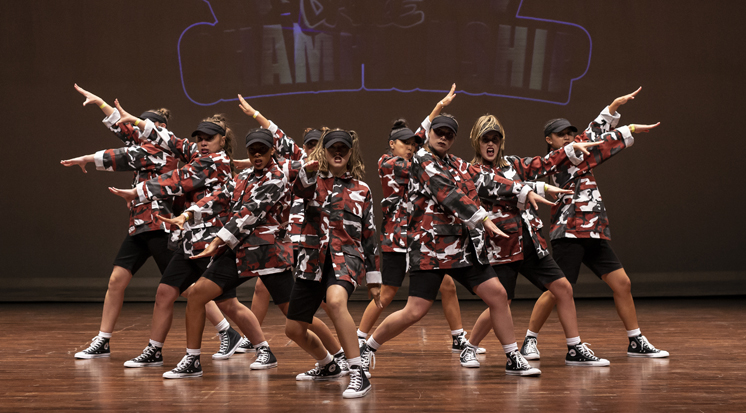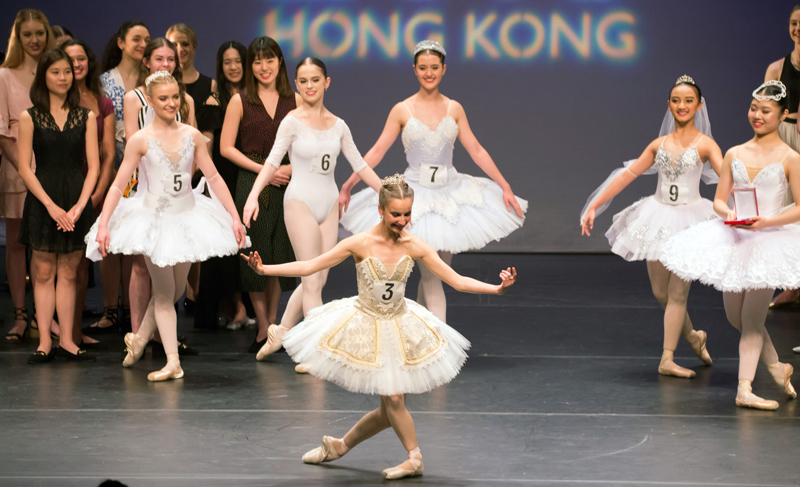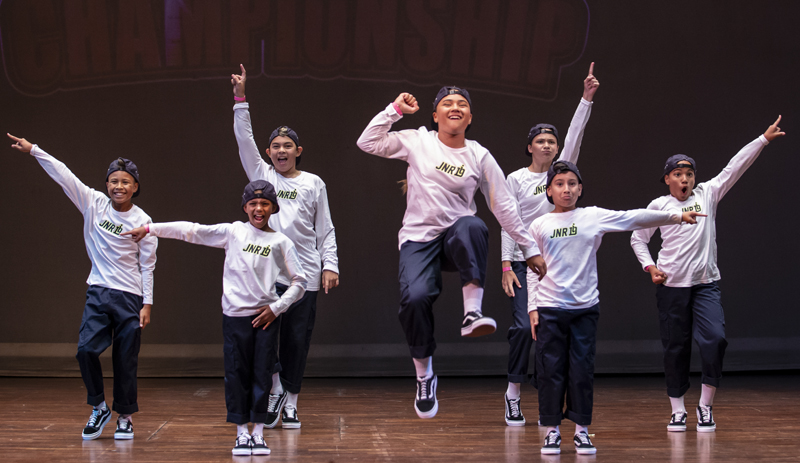Dance Competitions: A Curse or a Cure?
Three dance teachers share their personal perspectives on the pros and cons of dance competitions for a young dancer’s education, personal growth and relationships.

We spoke to Melinda Palmer (MP) from Mt Eden Dance Academy as she was about to accompany one of her students to the prestigious Prix de Lausanne ballet competition in Switzerland; Jacqui Cesan (JC), founder of The Dance Studio and Boyzdance; plus Geordan Wilcox (GW), Head of Dance at Saint Kentigern College.
WHAT HAS BEEN YOUR INTERACTION WITH DANCE COMPETITIONS?
MP: I’ve been involved since a child. I and my two younger sisters all competed, so there were a lot of competitions. Through the studio I have taught numerous students, preparing them for ballet competitions. Our student going to the Prix de Lausanne was the only one to successfully audition from New Zealand, and is one of the younger students in this year’s Prix.
JC: As a child I was involved in ballet competitions (comps). My next foray into competitions was as a parent. My three boys did the occasional comp – it was a great way of getting them to go 'all out' at their Jazz and Tap – boys seem to do better with an audience (albeit a small one). Competitions made them some great friends (Andrew’s partner is a girl he has known through comps since they were 7 years old), and encouraged them to develop performance skills.
As owner of The Dance Studio we do Jazz comps mainly with groups. This is a great way of advertising your studio and its ethics. For example, we often enter young under 12 groups in the junior Jazz section, where our dancers have appropriate costuming, no makeup and age-appropriate choreography and music as an advertisement for our belief in creating dance without the blatant sexualisation of young dancers. Unfortunately, in the age of the horrific reality show Dance Moms and American dance shows where tricks seem to have overtaken actual dance, the competition scene is no longer as palatable for us. I have huge issues with the lack of safe dance practice in particular, and that gymnastic skill has overtaken dance quality as a winning formula. The last time I went to a senior Jazz comp I wanted to cry. We have tried to update Tap comps also, however this artform has another problem – it’s stuck in a 1940's-time warp in most cases.
Hip Hop is a competitive dance form – this is how it started and it is the main activity for Hip Hop dancers. Winning competitions is the way you get your reputation and place. My boys and I have been involved in Hip Hop dance competitions for over 10 years and the boys have had considerable success. That has helped them enormously in the establishment of their respective dance careers.
GW: I had no competition experience at all in my early years of dancing. At Southern Ballet where I began my dance training, we performed regularly at the Southern Ballet Theatre. Russell Kerr, my teacher, taught us about performance and artistry, and I believe it was having the performance experience and opportunity that helped me to develop in my early years.
While I was dancing with the Royal New Zealand Ballet, the artistic director at the time asked me to choreograph a solo for company dancer Cameron McMillan for the Asian Grand Prix. I enjoyed the chance to choreograph on such a talented dancer. The challenge was putting together a dance piece that would highlight his ability and talent as a dancer and performer in the required two-minutes. Since then I have enjoyed choreographing ‘own choice’ solos for dancers that focus on highlighting artistic talent and technical ability, with a focus on growth in those areas.
I have also had experience adjudicating and coaching variations and have entered several students into competitions. Last year I had the opportunity to go to the Youth America Grand Prix Finals in New York and the Genée in Hong Kong.
WHAT DO YOU SEE AS MOST RELEVANT FOR YOUR STUDENTS/DANCERS, AND WHY?
MP: All have their place. The local competitions are good for experience, confidence, and just getting up there to perform. With the more international ones, such as the Alana Haines Australasian Awards, people work harder for them. There’s usually a few from the school competing in local competitions, but only a few dancers go to the bigger competitions. So, we can take them further with the preparation, focusing on one or two variations.
JC: The best opportunities are in Hip Hop where dancers can perform with a group and also have an overseas experience. Young Hip Hop dancers all want to represent New Zealand at the HHI World Hip Hop Dance Championship (HHI). Identity Dance Company, which is run by my son Josh, has had representative teams every year since 2013.
I feel reference should be made here (as a contrast) to the YouDance Youth Dance Festival held here in Auckland. It is growing year upon year, with an increasing number of school and community groups wanting to take part, and the consistent feedback we get is that it’s much more inclusive and friendlier than competitions. Youth from all over Auckland get to come and share their creative work and performance in a professional setting. Rather than being judged, professionals from the dance community are invited to give dancers and choreographers feedback on their work. I believe this is more valuable to young people than competitions because it encourages experimentation and creativity as well as performance, whereas at competitions generally the dancers have been trained by one teacher with little input from the student.
GW: My main reason for entering students in competitions is for them to have goals to work towards, to see and relate with their peers outside of their own dance studios, and for the performing experience.

WHAT BENEFITS DO YOUNG DANCERS GET FROM COMPETING?
MP: There are great scholarships on offer so it’s a real opportunity if they’re thinking of moving on with dance. Short-term scholarships are a good way to try the full-time schools and for the schools to see what the students can do. The bigger competitions are great exposure, and inspiring.
JC: The experience of performing as part of a group is invaluable learning. Not only for the discipline of practice and honing technical and performance skill, but also teaching valuable ensemble skill. For us this comes with groups in competition. The training also includes a wider education in dance. Dancers are actively encouraged to pursue education in other genres and at school where they learn about context, choreography and safe dance practice, among other things.
Hip Hop competition has been the conduit for getting boys into dance – because Hip Hop is cool, and they love to compete. This has driven the numbers of boys not only in dance but also exploring other dance avenues and going into tertiary training. An increasing number of our male graduates from New Zealand School of Dance, UNITEC and the University of Auckland began as dancers competing in Hip Hop.
GW: There are positives to dance competitions that have supportive learning environments with a clear focus on artistry, technical mastery and mentoring. The opportunity for dancers to perform, learn from others, develop their craft and skills and be mentored can be invaluable. There are also potentially opportunities for scholarships, prize money and for students to be noticed/seen by important dance personalities.
WHAT IS INVESTED BY THE DANCERS, AND YOU, FOR COMPETITION PREPARATION AND PARTICIPATION?
MP: Most who do competitions get 1-2 private lessons per week extra. Local competitions require choreography. Choreographing and finding the music is done by teachers at the school, then coaching. Some competitions require quite a number of dances. For the Prix de Lausanne there is a list of classical variations and a choice of contemporary solos. The student and teacher work together through videos of the contemporary solo, to get it right. For parents there’s the cost of extra lessons, costumes and transportation to the competitions as well as supporting them through extra practice.
JC: Far too much, which in many cases, might be better spent on further education. However again there are benefits.
GW: I work with many students who are passionate about their dancing but are overloaded with the commitment to continually rehearse for competitions and compete. I believe it is important to keep a balance, be selective about competitions and look at what is best for the individual dancer’s long-term development. A constant focus on competing can be detrimental to the progress of young dancers/artists and can come at a cost. It is important to keep a balanced approach and evaluate non-competitive performing experiences and opportunities with dance competitions.
HAVE THERE BEEN SUCCESS STORIES FOR DANCERS DIRECTLY ARISING OUT OF COMPETING?
MP: They’ve experienced different levels of success. A lot of our dancers have received scholarships to intensives. Some have won money, such as from the Sir John Logan Campbell Ballet Awards and Alana Haines Australasian Awards. Seven years ago was the last time one of our students went to the Prix de Lausanne. She received seven scholarship offers from full-time schools. That student went on to train at the Royal Ballet School and is now at Birmingham Royal Ballet. Former student Hannah O’Neill went to the Australian Ballet School. From there she competed and won the Prix de Lausanne, then was offered a contract with Paris Opera Ballet. It’s hard to say whether they would have done as well without the competitions. New Zealand doesn’t have the full-time schools for younger students, so it’s a pathway for dancers.
JC: Last year Identity Dance Company, as New Zealand champions took three teams and 40 young dancers to HHI, competing against 50 countries from around the world. All three teams made the finals, with one winning a bronze.
Look at the success that Parris Goebel has enjoyed. Her beginnings were as a competitor with groups in HHI, which certainly got her noticed. The rest is history and we now have a number of New Zealand dancers and choreographers who are working in the international industry. The training these teams receive as young dancers has helped to forge careers for them later.
GW: My wife, Jane Turner, and I worked with Monet Galea-Hewitt and had taught Monet outside of her dance studio since she was nine years old. I choreographed her 'own choice' for the Genée International Ballet Competition. It was such a great journey working with Monet, and because of the connection Jane and I had with her, we decided to make the trip to see her dance at the Genée. It was a wonderful event and made even more special with Monet winning Gold.
ANY NEGATIVE CONSEQUENCES?
MP: There’s always going to be a trade-off. Overall, I think it’s positive. There’s always something else to prepare for which can mean there’s not a lot of time to perfect things.
JC: Yes, in Hip Hop. It is so competition focused that dancers rely on the competition formulae or YouTube videos to create. We realised this a few years ago and hence developed other formats for Hip Hop dancers; for example, Out of the Box, a fusion of street and contemporary dance forms in performance. We also try to get dancers to broaden their vision beyond just competition.
GW: While at the Youth America Grand Prix I had a conversation with a colleague about the calibre of the dancers. The discussion came around to how the dancers were all very good at tricks and were extremely well-practiced in their variations, but many seemed to lack a level of artistry and technical proficiency, which was sacrificed for more turns and tricks.
One boy performed a triple tour en l’air in his variation, which was an incredible feat that I have never seen done before, but it was not all that well executed. There was a wow factor in that he had got around three times, but to me to see a perfectly executed double has more impact and has a different energy/expression to it. That shows self-control, refinement and an understanding of what is important.
OVERALL WHAT ARE YOUR FEELINGS ABOUT THE IMPACT OF DANCE COMPETITIONS FOR YOUNG DANCERS?
MP: The dancers handle winning and losing pretty well. The more they compete, the more that resilience develops. If they only did them now and again it might be more difficult. Most of the dancers are really good friends and at the competitions they’re having a great time. They love seeing all their friends and having that extra time hanging out with them.
JC: Competitions are a great experience for groups – they learn wonderful team skills and develop discipline in training. Hip Hop provides opportunities to travel. However, my main concern is that there are too many involved that have little or no understanding of safe dance practice and are impressed by tricks over true artistic expression. I also don't like the competitive element in solo competitions where frankly I have seen a few dance moms and prima donnas emerge. Also there needs to be regulation around what is appropriate in music and costume for certain age groups. I question the need for solo competition other than in Ballet, as Jazz and Hip Hop dancers generally perform in groups anyway.
GW: Competitions offer many positives for young dancers and the experience can be invaluable. However, there can be too much focus on the importance of competitions for young dancers and with that, tricks to impress, often not well or safely done. It is important to think about the longterm development of young dancers, and it is also important that dancers are performing appropriate vocabulary for their age or level. I am a strong believer in quality above quantity and keeping a balanced approach to competitions.
Download the article: Dance_Competitions_-_A_Curse_or_a_Cure

